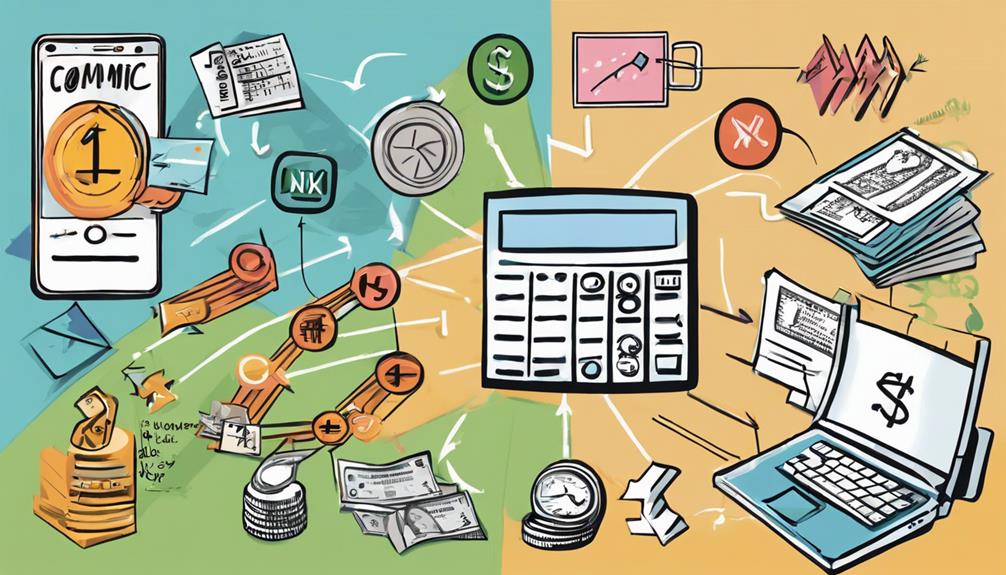Numeracy lies at the core of financial empowerment, aiding in achieving monetary goals and managing resources wisely. From savings to investments and budgeting, numeracy skills encompass various aspects essential for financial success. Understanding exchange rates, calculating returns on investments, and grasping money transfers play key roles in making informed financial decisions. Additionally, enhancing numeracy skills not only boosts personal finance but also opens doors to better job opportunities. Embracing numeracy illuminates the path towards economic freedom and stability. Start with these basics to grasp the essence of financial empowerment.
Key Takeaways
- Essential for financial freedom: Enables savings, investments, budgeting, and understanding financial transactions.
- Enhances employability: Valued in the workforce for handling money, data analysis, and decision-making.
- Empowers economic competitiveness: Vital for thriving in a global market and achieving financial success.
- Improves decision-making: Enables informed choices on investments, loans, and financial planning.
- Enables long-term wealth creation: Understanding numeracy leads to smart financial decisions for a secure future.
financial calculator for investments
As an affiliate, we earn on qualifying purchases.
As an affiliate, we earn on qualifying purchases.
Importance of Numeracy in Finance

Why is numeracy essential for achieving financial empowerment and success in managing personal finances?
Numeracy skills play a critical role in financial freedom, encompassing savings, investments, budgeting, time management, and various business applications. Understanding concepts such as exchange rates, money transfers, bill payments, and calculating return on investment are essential for making informed financial decisions.
Poor numeracy skills can hinder employability, impact physical health, self-esteem, and even hinder the ability to own a home. Enhancing numeracy skills involves strategies like using graphs and tables, practicing arithmetic, integrating mathematical tools, and reinforcing concepts through the curriculum.

SKYDUE Budget Binder, Money Saving Binder with Zipper Envelopes, Cash Envelopes and Expense Budget Sheets for Budgeting
Cash Envelopes System:1pcs PU leather money saving binder,8pcs A6 6-holes binder pockets,12pcs expense budget sheets,3 sheets of category…
As an affiliate, we earn on qualifying purchases.
As an affiliate, we earn on qualifying purchases.
Global Numeracy Crisis Overview

The global numeracy crisis presents a pressing challenge that demands immediate attention and strategic interventions to address deficiencies in mathematical proficiency on a worldwide scale. This crisis is evident in various countries, including the UK, where disappointing GCSE mathematics scores and low percentages of students achieving top grades reflect the need for improvement. Comparisons with top-performing nations like China and Vietnam highlight the urgency to enhance numeracy skills for economic competitiveness. The introduction of new grading systems and rankings in PISA data emphasize the critical nature of this issue. Below is a table providing a snapshot of the numeracy crisis in different regions:
| Region | Numeracy Proficiency | Impact on Competitiveness | Strategies for Improvement |
|---|---|---|---|
| UK | Low | Urgent need | Enhance curriculum |
| China | High | Strong advantage | Emphasize arithmetical skills |
| Vietnam | High | Competitive edge | Integrate mathematical tools |

Currency converter – exchange rates
Offline mode
As an affiliate, we earn on qualifying purchases.
As an affiliate, we earn on qualifying purchases.
Richard James Rogers Online Community

Joining the online community curated by Richard James Rogers offers a platform for daily updates and engagement opportunities. This vibrant community, accessible through Facebook and Twitter, provides valuable insights into education, numeracy, observations, school, students, and technology.
Richard James Rogers, a respected High School Science and Mathematics Teacher, Author, and Blogger, shares his expertise through regular posts that cover a wide range of relevant topics.
By following and engaging with this community, members can stay informed about the latest trends, strategies, and resources related to numeracy and education.
Don't miss out on the chance to connect with like-minded individuals, exchange ideas, and enhance your knowledge in the field of numeracy and teaching.

Marketing Calculator: Measuring and Managing Return on Marketing Investment
As an affiliate, we earn on qualifying purchases.
As an affiliate, we earn on qualifying purchases.
Strategies for Teaching Numeracy

Strategies for effectively teaching numeracy encompass a range of practical methods to engage students and enhance their mathematical proficiency. By making math fun and interactive, educators can captivate students' interest and boost their skills. Patience and clear explanations are key, fostering a mindset that views the world through mathematical lenses.
Incorporating arithmetical drills during tutor time and immersing mathematical language in subject-specific contexts deepen understanding. Practical applications of numeracy tools across various subjects and aligning concepts with the school's math curriculum reinforce learning. Emphasizing the significance of numeracy for economic competitiveness and global math proficiency benchmarks motivates students to excel.
Through these strategies, educators can empower students to embrace numeracy confidently and navigate financial challenges with ease.
Enhancing Numeracy Skills

Numeracy skills can be greatly enhanced through consistent practice and the integration of real-world applications in educational settings. By practicing arithmetic regularly, students can improve their ability to perform quick and accurate calculations.
Utilizing graphs and tables can help visualize data and enhance understanding of mathematical concepts. Real-life scenarios such as budgeting, calculating discounts, and understanding interest rates can make math more engaging and applicable.
Integrating mathematical tools like calculators and software can simplify complex problems and promote problem-solving skills. Additionally, linking math curriculum with other subjects can reinforce learning and show the practicality of numeracy skills in various fields.
Numeracy Skills for Economic Competitiveness

Enhancing numeracy skills is essential for maintaining economic competitiveness in a rapidly evolving global landscape. In today's world, where economies are interconnected and businesses operate on an international scale, individuals with strong numeracy skills have a competitive edge. Proficiency in areas such as financial analysis, data interpretation, and statistical modeling is critical for making informed decisions that drive economic growth and innovation.
By honing numeracy skills, individuals can navigate complex financial markets, analyze trends, and contribute to strategic planning that fosters competitiveness in the global marketplace. Additionally, a skilled workforce adept in numeracy can fuel economic development, attract investment, and propel industries forward.
Therefore, investing in numeracy education is not just about personal development but also about ensuring economic vitality and prosperity on a broader scale.
Post Navigation and Interaction

Interaction options within the post include scrolling to previous or subsequent posts and engaging by leaving a reply or opting to cancel.
| Interaction Options | Description |
|---|---|
| Scroll to Previous | Navigate to the previous post to explore related content or revisit key information. |
| Scroll to Next | Move forward to the subsequent post for further insights or to continue the learning journey. |
| Leave a Reply | Engage with the community by sharing thoughts, asking questions, or providing feedback. |
| Cancel | Opt-out of leaving a reply if you prefer to continue reading or exploring other content options. |
Frequently Asked Questions
How Can Numeracy Skills Impact Personal Financial Decisions?
Numeracy skills profoundly influence personal financial decisions by enabling individuals to comprehend budgets, investments, and financial risks. Competence in mathematics empowers informed choices, enhances economic stability, and fosters prudent financial planning, essential for achieving financial security and prosperity.
What Are the Top-Performing Countries in Global Numeracy Rankings?
In the domain of global numeracy rankings, top-performing countries like China and Vietnam stand out for their excellence in mathematics proficiency. Their success underscores the need for continuous improvement in numeracy education worldwide.
How Can I Join Richard James Rogers' Online Community?
To join Richard James Rogers' online community, visit Facebook and Twitter. Engage with daily updates by sharing content, liking, and interacting. Richard, a High School Science and Mathematics Teacher, holds a BSc (Hons) in Molecular Biology and a PGCE in Secondary Science Education.
What Are Practical Strategies for Teaching Numeracy in Schools?
Practical strategies for teaching numeracy in schools involve engaging students with math games, clear explanations, and real-world applications. Utilize mathematical tools, reinforce concepts across subjects, and emphasize economic competitiveness and global proficiency in mathematics.
How Do Numeracy Skills Contribute to Economic Competitiveness?
Numeracy skills are the bedrock of economic competitiveness, fueling financial empowerment. Mastery of mathematics underpins savings, investments, budgeting, and critical decision-making. Enhanced numeracy not only sharpens financial acumen but also drives innovation and prosperity in a dynamic global economy.
Conclusion
In a world where financial literacy is key to success, numeracy stands as the foundation for accessing economic opportunities and securing a stable future.
Stay tuned for more insights on how mastering numerical skills can pave the way to financial empowerment and prosperity.
Get ready to take control of your financial destiny and venture towards a brighter and more secure tomorrow.
Let's delve deeper into the domain of numeracy and open the doors to financial independence together.









